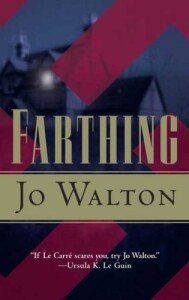Lory Hess penned this review.
Jo Walton has a knack for genre fiction with a twist. In the World Fantasy Award-winning Tooth and Claw, she gave us a Victorian family saga — complete with siblings squabbling over an inheritance, the woes of the unwed daughters of the house, and the very important question of What Hat to Wear — with a cast of dragons, literally red in tooth and claw. Now in Farthing, her material is the mid-century British country house murder mystery. The story is told in alternate chapters through the eyes of Lucy Kahn, a reluctant visitor to the family estate of Farthing, and over the shoulder of Inspector Carmichael, who has been sent from Scotland Yard to investigate the death of one of the other guests.
Evidence of political backbiting, personal blackmailing, and marital mismatches piles up as usual in such scenarios, but the most startling piece of all (and the most overlooked by the central characters) is that this Britain of 1949 has been at peace with Hitler for eight years, letting him take the Continent in exchange for leaving Britain a nominal independence. But what powers are working behind the scenes, and what direction will the country take following the death of a prominent English politician?
This is the crucial question for Lucy, for she has recently married David Kahn, a wealthy London Jew. The Jews in Britain are tolerated publicly but privately despised by many, including Lucy’s mother, Viscountess Lady Eversley, who incidentally is at the center of the “Farthing Set” who negotiated peace with Hitler. Lucy, a feisty but rather flighty character who views her unconventional marriage as a minor social inconvenience — regretting that she’ll no longer be able to shop in Paris — must mature considerably as she awakens to the seriousness of the situation. Her husband, a well-meaning innocent, is being framed for the murder, and it soon becomes clear that his declaration that “there are no fascists in England” isn’t quite accurate, especially in regard to his in-laws.
Meanwhile Carmichael struggles to see justice done, but finds himself caught no less in the web of political intrigue. In the tradition of the literary detective, he searches out others’ secrets while concealing his own. But the convention of the classic detective story is invoked only to be subverted, as no satisfaction in learning “whodunit” can mitigate the tragedy of a whole world colluding in murder and injustice.
The pace is uneven, building slowly in the first half as evidence is amassed unfruitfully, the two-voice structure allowing us to see what Lucy and Carmichael respectively miss. The second half escalates quickly to a tense and comfortless finish. Walton doesn’t rival her models Josephine Tey or Dorothy Sayers in the mechanics of mystery writing — the puzzle itself struck me as rather loose and sloppy. The focus is more on the characters, and there she succeeds in gaining our sympathy for both protagonists, who, as they make their “fantastic” situation real and present to us, call for us to ask what their dilemma means for us here and now.
Like a man-headed dragon, Farthing initially presents itself as something relatively familiar and innocent, but packs a wallop in the tail. Though it wears the trappings of a lighthearted entertainment, don’t read it unless you’re prepared to look at our own world in a different way: with anger, with tears, with questions that demand our immediate attention.
(Tor, 2006)

